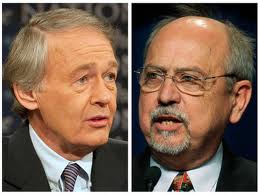Democrats and Republicans are jockeying for the title of Gas Price Slasher, though neither party has a plan that has any potential to reduce prices. While Democrats propose cutting oil company subsidies, Rep. Doc Hastings (R-WA) has introduced three bills to expand oil drilling, saying that they’ll spur employment in the Gulf and reduce U.S. dependence on foreign oil.

The Natural Resources Defense Council’s David Goldston, in his excellent summary of the legislation on NRDC's Switchboard blog, says these bills would “open almost all the waters of the U.S. to oil drilling; prevent any judgments from being made about where and when and how to drill; tie the hands of this and future administrations and the courts; and weaken the system of safety and environmental review. Quite a legacy.”
Congress hasn’t passed a single piece of legislation since the Deepwater Horizon disaster last April to make drilling safer. The House passed a safety bill (when it was still controlled by Democrats) but the Senate blocked it. If passed, these bills would be the first action Congress takes on drilling since the spill.
The three bills the Republicans are bringing to the floor – two of them as early as tomorrow – are:
- H.R. 1229, the Putting the Gulf of Mexico Back to Work Act, which would set a 30-day time limit for reviews of drilling permit applications, with automatic approval kicking in after 60 days
- H.R. 1230, the Restarting American Offshore Leasing Now Act, which would mandate that the government sell oil and gas drilling leases in the next year for the central and western Gulf of Mexico and off the coast of Virginia – areas the administration decided not to lease after the Gulf oil spill last year. The bill also blocks court review of controversial environmental impact statements done before the spill.
- H.R. 1231, the Reversing President Obama’s Offshore Moratorium Act, is by far the most controversial (and has such a partisan name it virtually guarantees that no Democrats will vote for it). It would mandate that at least half the unleased area off the East Coast, the Southern California coast, the Arctic Ocean and Alaska's Bristol Bay be put up for lease sales every five years until there's nothing left to lease. Most troubling, future administrations could not reconsider or change this mandate, even in the event of a spill, or economic damage to tourism or another industry, or because there was no capacity to handle a potential emergency.
"This is replacing oil policy with a kind of oil mania," wrote Goldston. It's as if Hastings set out to prove just how addicted the country is to oil, he went on: "Under these bills, the U.S. would truly be acting like an addict, willing to sell out any principle, dispense with any caution, endanger any asset to get its next fix."

In addition, an amendment slipped into one of the bills, according to Rep. Ed Markey, ranking Democrat on the Natural Resources Committee, provides for the extension of about 100 drilling leases, rather than putting them back on the open market for bids. He says that will cost taxpayers $10 billion and will require some fancy legislative footwork to resolve the hit to the budget.
New Jersey Democrat Rush Holt, speaking to reporters this morning, called the bills “amnesia acts,” since they completely ignore what happened last spring in the Gulf. Using high gas prices as leverage to pass these bills, Holt said, is disingenuous. The nonpartisan Energy Information Administration has said the Republican bills would have a negligible impact on gas prices for the next decade. “Maybe some pennies 10 or 20 years after that,” Holt said, “Pennies in the gas price are what occurred between 11 a.m. and noon.”
Democrat Tim Bishop (D-NY) filed a bill yesterday to repeal tax breaks for oil companies – something House Speaker John Boehner said last week that he supported, before backpedaling on those remarks. Bishop’s Big Oil Welfare Repeal Act (H.R. 1689) would repeal the domestic manufacturing tax credit for the big five U.S. oil companies, saving $1.5 billion a year. “This is a pure and simple tax subsidy that the American taxpayers are providing to five of the most profitable corporations in the world,” Bishop said, "even as they are paying now, in my home district, as much as $4.40 for a gallon of regular." Meanwhile, the big five oil companies posted profits of $31.7 billion in the last quarter.
Bishop’s bill attracted 59 co-sponsors its first day; not one was from the Republican party.
Repealing oil companies’ tax breaks is good symbolism and certainly a step in the right direction, but the $1.5 billion a year it’ll save won’t actually do anything about gas prices, though Bishop says since drivers also pay taxes, and it’ll save taxpayers money, it’s the same effect. (Indeed, transit riders, bicyclists and pedestrians might also appreciate not subsidizing deepwater drilling and oil fat-cat salaries.)
But the Democrats did mention to reporters another initiative that could have a greater impact. Goldman Sachs recently rocked oil markets by announcing their conclusion that about a fifth of the barrel price of oil was based on pure speculation. Goldman called for a $20 drop in the price of a barrel of crude oil, now valued at $109.14. Speculation “has to be wrung out of the system,” said Rep. Markey.
The GOP, always hostile to financial regulation, tried to cut the funding for the Commodity Futures Trading Commission in the last budget fight -- the one entity that could rein in speculation. They didn’t succeed, but they’re likely to fight the budget increases the CFTC is asking for now. “The Republicans want to not only stand on sidelines, but to take the referee off of the field,” Markey said.
So maybe last year’s financial reform law, by strengthening regulatory bodies like the CFTC, really has the best chance of lowering gas prices. Clearly drilling isn’t going to do anything, and neither will the repeal of tax breaks, though that’s what Congress is fighting over now.
Of course, many argue gas prices don’t need to come down at all. In order to reverse decades of U.S. public subsidization of car culture and encourage mode shift – and to bring the U.S. in line with other developed nations – gas prices could actually go far higher.





